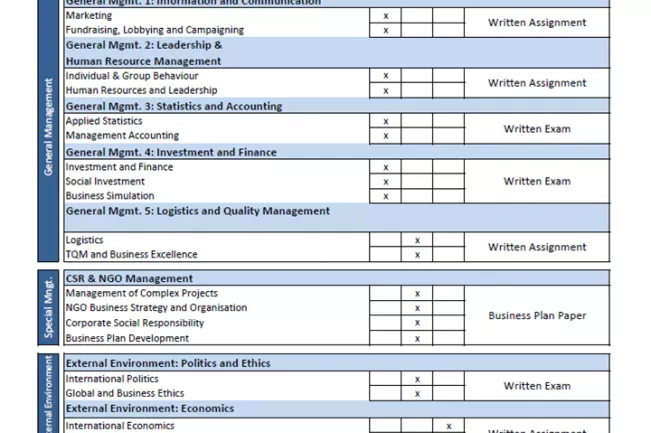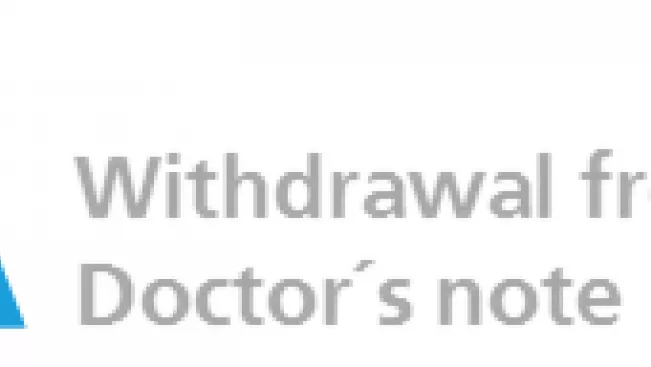Fachbereich Wirtschaftswissenschaften
4 \\ Exams & Teaching Methods
The lecturers of the MBA in CSR & NGO Management provide a wide range state-of-the-art teaching methods and didactics to our students:
- Presentations and guest lectures by professionals
- Individual exercises and group work
- (Dynamic and practical) case studies
- Team and group discussions
- Field trips and excursions
- Interactive teaching discussions
- Business simulation
- Oral team/class presentations
- Practical exercises
Lecturers also share their own practical experience to build a constructive environment and give students an in-depth, hands-on learning experience.
Teamwork is encouraged in most of the courses. Frequent teamwork helps build a sense of responsibility.
The MBA students are expected to prepare some assignments collaboratively, such as papers, oral presentations, business plans, and case studies. Considering that students come from different educational and professional backgrounds and most have substantial work experience, team assignments help them learn from each other and from sources like the faculty, texts, books, articles, and practical cases. Graduates can exchange the skills with specialists and outsiders alike.
The MBA programme uses many case studies with a focus on CSR and NGOs. Students are introduced to a real situations and receive some background info on the organisation and its operating environment. They are then expected to identify the key issues, evaluate options, make a reasonable decision, recommend a clear plan of action, and defend their position.
In addition to the case study method, instructors use and combine other teaching methods, such as role-playing, field trips, guest speakers, interactive discussions, lectures, oral presentations, simulations, research projects, pitch sessions, and business plan workshops.
Many of our lecture formats allow room for discussion and exchange. This, in turn, allows students to develop formal and informal professional communication skills. They learn interdisciplinary thinking through focused work in intercultural groups. Presentations, group discussions, teamwork, and individual projects test and improve the student’s communication skills.

Exam types for the MBA
- Written exams (mostly essays)
- Academic papers (use the HBRS academic writing guidelines)
- Business plans (as group projects)
- Oral presentations (e.g. in elective classes)
- Internship reports (for students who entered the MBA programme with
less than 210 ECTS credits) - Master’s thesis

General Principles
Students must submit a medical certificate to the Examinations Office by mail or in person as soon as they decide not to participate. The certificate must be handed in before the exam date. Otherwise the missed exam is counted as a fail.
Procedure for HBRS students
The non-participation of an exam requires the form "Withdrawal from Examination due to Illness" and a doctor's note. The moment of the first entry of the attestation is crucial.
The form and the original certificate must be submitted in advance. Incomplete forms will not be considered. If the Examinations Office has any reason to believe that the medical certificate is inaccurate, it can require you to see a public health officer.
Sick students must supply proof by submitting a medical certificate to the Examinations Office. A precise diagnosis is helpful, but not necessary. The exact reason for the absence is irrelevant. However, the certificate must contain a formulation such as "Due to sickness, Mr.... / Ms... [student’s name] is not able to attend today’s exam" and be signed by the doctor with a stamp of the medical facility. The medical certificate must be submitted no later than the day of the exam. The period of sickness must include the exam date, and the original medical certificate must be submitted to the Examinations Office within three days of issue.
What to do if you’re sick? A step-by-step guide:
- In case of sickness, visit the doctor no later than the date of your examination to get an official doctor’s note. NOTE: Your attested sick period must cover the examination day!
- Scan your medical certificate and the form "Withdrawal from Examinations".
- Send both scanned papers by e-mail to the Examinations Office via pruefungenmasterCR@h-brs.de AND add the MBA Support Office (info@mba-ngo.com) as CC recipient.
- Immediately after the e-mail, please send the original doctor’s note by mail to the Examinations Office under the following address:
Hochschule Bonn-Rhein-Sieg
Campus Rheinbach
Prüfungsservice / Examinations Office
Ms Angelika Dierich
Von-Liebig Str. 20
53359 Rheinbach
PLEASE NOTE!
Your withdrawal from the exam is only valid, if the Examinations Office has received the original medical certificate by mail within three days of the exam date! If you fail to comply, you won’t be allowed to retake the exam.